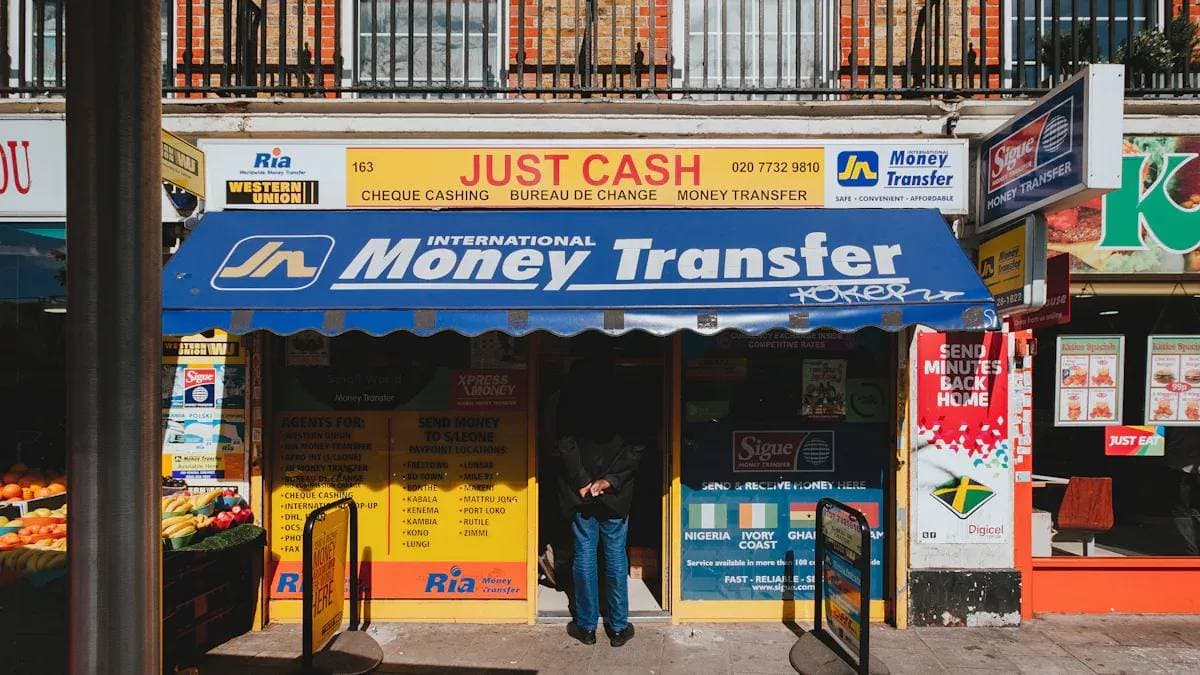- EasyCard
- Trade
- Help
- Announcement
- Academy
- SWIFT Code
- Iban Number
- Referral
- Customer Service
- Blog
- Creator
Simple Ways to Apply for CPF or CNPJ as a Non-Resident

Image Source: pexels
You can get a CPF or CNPJ in Brazil even if you live abroad. These numbers act as your tax identification number and help you handle many legal and financial tasks. Many expats need a CPF to buy property, open a bank account, or sign contracts. A CNPJ helps if you want to create a company or manage rental income. You can start your application online, at a Brazilian consulate, or through a legal representative.
- Common reasons to apply for a CPF or CNPJ include:
- Buying property and registering deeds
- Opening personal bank accounts
- Managing rental income or multiple properties
- Staying compliant with tax laws and avoiding problems during resale
- Setting up a business with a tax id in Brazil
Key Takeaways
- CPF is for individuals and needed for personal financial tasks like buying property or opening bank accounts; CNPJ is for companies and required to start or run a business in Brazil.
- Non-residents can apply for CPF online, at Brazilian consulates, or through legal representatives without traveling to Brazil, but must attend an in-person consulate appointment since late 2023.
- To apply for CPF or CNPJ, gather all required documents such as a valid passport, proof of address, and official forms; incomplete documents can delay your application.
- For CNPJ, foreign applicants must appoint a Brazilian legal representative and follow steps including registering the company and submitting certified documents with sworn translations.
- Keep your CPF and CNPJ information updated to avoid problems with banks, property, and taxes; store your numbers safely and seek help if you face issues during the process.
CPF or CNPJ: Which Do You Need?
CPF vs CNPJ Overview
You may wonder if you need a CPF or CNPJ for your activities in Brazil. Both serve as a tax identification number, but they have different uses. CPF stands for cadastro de pessoa física, which means individual taxpayer registry. CNPJ is the identifier for companies and legal entities.
Here is a simple table to help you see the main differences:
| Aspect | CPF (Cadastro de Pessoas Físicas) | CNPJ (Cadastro Nacional da Pessoa Jurídica) |
|---|---|---|
| Eligibility | Individuals, including foreigners/non-residents | Companies and legal entities, including foreign companies |
| Purpose/Usage | Personal financial and legal activities (e.g., opening bank accounts, purchasing property, sending money) | Business/commercial activities, owning assets, customs declarations |
| Issued by | Brazilian Federal Revenue Bureau | Brazilian Federal Revenue Bureau |
| Application for Non-residents | Can apply via Brazilian consulates or by mail with required documents | Required for foreign companies to operate or invest in Brazil |
| Number Format | 11 digits | 14 digits |
You use a CPF for personal matters, such as opening a bank account or buying property. You use a CNPJ if you want to open a company in Brazil or manage business activities. Both numbers come from the Brazilian Federal Revenue Bureau.
When Non-Residents Need a CPF or CNPJ
You need a CPF or CNPJ if you plan to handle financial or legal tasks in Brazil. If you want to buy real estate, open a bank account, or send money, you need a CPF. This number acts as your individual taxpayer registry and helps you stay compliant with local laws.
If you want to start a business or invest as a company, you need a CNPJ. This identifier is required for any legal entity that wants to operate or own assets in Brazil. You cannot open a company in Brazil without a CNPJ.
Tip: Always check which identifier you need before starting your application. Using the right tax id in Brazil helps you avoid delays and legal issues.
You can apply for a CPF or CNPJ even if you live outside Brazil. The application process is clear, and you only need to prepare the correct documents. Both numbers are important for anyone who wants to manage assets or run a business in Brazil.
CPF (Cadastro de Pessoa Física) for Non-Residents

Image Source: pexels
What is CPF and Cadastro de Pessoa Física
The CPF, or Cadastro de Pessoa Física, is a unique tax identification number issued by the Federal Revenue Bureau of Brazil. You use this number as your individual taxpayer registry for many activities in Brazil. The Federal Revenue, also known as Receita Federal, manages the CPF system. The CPF replaced the older Taxpayer Identification Card in the 1980s and now serves as the main document for tax accountability and social security.
You need a CPF if you want to open a bank account, buy property, or sign contracts in Brazil. The CPF acts as your official identifier for tax and legal matters. Many government agencies, banks, and private companies accept the CPF as a valid identification document. The purpose of having a CPF is to help you handle personal and business-related activities across Brazil. If you are an expat or a foreigner with assets or business in Brazil, you must obtain a CPF for foreigners to stay compliant with local laws.
How to Apply for a CPF Number
You can apply for a CPF number even if you do not live in Brazil. The Federal Revenue Bureau offers several ways to get a CPF number. You can apply online, at a Brazilian consulate, or through a legal representative. The process to apply for a CPF number is clear and does not require you to travel to Brazil.
Here is a step-by-step guide to help you apply for a CPF number as a non-resident:
- Applying from Abroad (Online and Consulate Options):
- Register on the e-Consular platform and select the Brazilian Embassy or Consulate that covers your area.
- Complete the CPF application form on the Receita Federal website. Make sure you fill in your personal details correctly.
- Print the CPF registration form (FCPF) after submitting your application.
- Schedule an in-person appointment at the Brazilian consulate using the e-Consular system.
- Bring all required documents to your appointment, including your passport and proof of address.
- Submit your documents through the e-Consular system and attend your appointment.
- Applying by Email (Some Jurisdictions):
- Prepare digital copies of your passport, a selfie holding your passport, proof of address, and the completed CPF application form.
- Attach all documents to an email and send it to the Federal Revenue Bureau office that covers your region.
- Use the correct subject line and template as instructed by the Federal Revenue.
- Wait for a confirmation email and respond if more information is needed.
- Receive your CPF number by email after approval.
- Applying in Brazil (If You Visit):
- Visit a branch of Banco do Brasil, Caixa Econômica Federal, or Correios.
- Present your passport and proof of residence.
- Pay the application fee (about USD $1.50, based on current exchange rates).
- Return to the Federal Revenue Bureau with your receipt and passport to issue a CPF number.
Note: Since late 2023, all non-residents must schedule an in-person appointment at the consulate when applying from abroad. This step helps the Federal Revenue Bureau verify your identity and documents.
Required Documents for CPF
You must prepare the required documents for issuing a foreigner’s CPF before you start your application. The Federal Revenue Bureau will only issue a CPF number if you provide all necessary paperwork. Here is a list of what you need:
- Valid passport (showing your full name, date of birth, and nationality)
- Proof of address (can be from your home country or Brazil)
- Completed CPF application form (downloaded from Receita Federal)
- For minors under 16: Birth certificate and presence of parents or legal guardians with their IDs
- For adults: Birth certificate showing parents’ names (with official translation if not in English, Portuguese, or French)
- Notarized declaration from a host family if you stay with someone in Brazil (if applicable)
- Parents’ names (required on the application form)
- Selfie holding your passport (for online applications)
- CPF Tax Status Document (if requested)
Tip: Always double-check your documents before submitting your application. Incomplete or unclear documents can delay the process.
Where to Apply for CPF
You have several options to apply for a CPF number, depending on your location and situation:
| Application Method | Where to Apply | Who Can Use This Option |
|---|---|---|
| Online (e-Consular) | Brazilian Embassy or Consulate via e-Consular | Non-residents applying from abroad |
| Federal Revenue Bureau office (by region) | Some non-residents | |
| In Person (in Brazil) | Banco do Brasil, Caixa Econômica Federal, Correios | Visitors in Brazil |
| Legal Representative | Appointed attorney or representative in Brazil | Those needing remote assistance |
If you want to issue a CPF for foreigners not residing in Brazil, you should use the e-Consular system and attend your appointment at the nearest Brazilian consulate. If you are in Brazil, you can visit a bank or post office to start your application.
Processing Time and Tips
The Federal Revenue Bureau usually processes CPF applications quickly. If you apply online or by email, you may receive your CPF number within a few days. If you apply at a consulate, processing may take up to two weeks, depending on the volume of requests and the accuracy of your documents.
The application fee is about USD $1.50, but some consulates may waive this fee for certain cases. Always check the latest fee and exchange rates before you apply.
Common challenges include missing documents, unclear photos, or mistakes on the application form. You can avoid delays by preparing all documents carefully and following the instructions from the Federal Revenue Bureau.
If you face problems such as irregular CPF status, suspension, or duplication, you should contact the Federal Revenue Bureau or seek help from a legal representative. Legal representatives can help you manage the process, prevent errors, and resolve issues with your CPF status.
The CPF is your key tax id in Brazil. You need it for many activities, such as buying property, opening a bank account, or starting a business. The Federal Revenue Bureau uses the CPF to track your tax obligations and legal activities. Always keep your CPF information safe and up to date.
The CPF, or natural persons register, is essential for anyone who wants to participate in Brazil’s financial and legal system. Applying from abroad is possible, and the process is now more secure and efficient thanks to the e-Consular system.
CNPJ for Foreigners
What is CNPJ
The CNPJ, or Cadastro Nacional de Pessoas Jurídicas, is the national registry for legal entities in Brazil. The Federal Revenue Bureau, also known as Receita Federal, manages this system. You use the CNPJ as the official tax identification number for companies, partnerships, investment funds, and other legal entities. The CNPJ consists of 14 digits, which include a unique identifier, a branch code, and check digits. This number replaced the older CGC system in 1998. The Cadastro Nacional da Pessoa Juridica allows you to verify any company’s status in a public database. If you want to open a company in Brazil, you must obtain a CNPJ. This number is essential for commercial transactions, government records, and compliance with Brazilian law.
The CNPJ enables you to legally conduct business activities in Brazil. You need it to own assets such as real estate, vehicles, or bank accounts. The CNPJ also helps reduce fraud and ensures that you follow the rules set by the Federal Revenue. If you plan to operate as an individual microentrepreneur or a sole entrepreneur, you still need a CNPJ to register your business and pay taxes.
The CNPJ is the main tax id in Brazil for legal entities. Without it, you cannot open a company in Brazil or participate in most business activities.
How to Register for a CNPJ
You can obtain a CNPJ even if you do not live in Brazil. The process involves several steps, and you must follow the legal requirements set by the Federal Revenue Bureau. You need to appoint a legal representative who lives in Brazil. This person will act on your behalf during the application and registration process.
Here is a step-by-step guide to help you register for a CNPJ:
- Decide on the type of company you want to open in Brazil, such as a limited liability company, individual microentrepreneur, or sole entrepreneur.
- Appoint a Brazilian resident as your legal representative. This person must have a CPF and the authority to act for your company.
- Prepare the Articles of Association or Incorporation. This document must include your company’s name, business address, activities, share capital, and management structure.
- Certify and legalize all foreign documents at the Brazilian consulate. You must also obtain sworn translations for any documents not in Portuguese.
- Register the Articles of Association at the State Board of Trade (Junta Comercial) or the Business Entities Registry.
- Obtain the NIRE (Company Registration Number) from the Board of Trade. This confirms your company’s legal existence.
- Apply for the CNPJ at the Federal Revenue Bureau. You must provide the NIRE, Articles of Association, power of attorney for your legal representative, and identification for all shareholders and directors.
- Register with state and municipal authorities if your business activities require it. This includes state registration for companies involved in manufacturing or sales and municipal registration for service companies.
- Obtain any additional licenses, such as a municipal operating permit or firefighter authority license, depending on your business sector.
- Register with Social Security (INSS) within 30 days of starting operations.
You can complete most of these steps remotely by granting power of attorney to your legal representative in Brazil. The process often requires digital certificates for secure online submissions.
Documents Needed for CNPJ
When you apply for a CNPJ, you must gather several documents. The Federal Revenue Bureau and other authorities require these documents to verify your identity and the legitimacy of your business. Here is a list of the main documents you need:
- Notarized identification documents for the company administrator.
- Articles of Association or Incorporation, registered at the Board of Trade.
- Power of Attorney granting authority to your legal representative in Brazil.
- Apostilled or legalized corporate documents from your home country.
- Sworn translations of all documents not in Portuguese.
- Proof of registered business address in Brazil.
- CPF numbers for all shareholders and directors.
- Formal request for business license registration.
- Payment receipt for the registration fee (Documento de Arrecadação Avulso or DAR).
- Real estate clearance certificate, if your business owns property.
- Statement of responsibility signed by the legal representative.
- Confirmation of CNPJ registration from the Federal Revenue Bureau.
All foreign documents must be legalized and apostilled if required. You must send hard copies to Brazil and ensure that all translations are done by an official sworn translator.
Key Steps for Foreign Applicants
If you want to open a company in Brazil as a foreigner, you must follow some special steps and meet extra requirements. The process can seem complex, but you can manage it with careful planning and the help of a local legal representative.
- Appoint a legal representative who is a Brazilian resident. This person will handle your application and represent your company before the Federal Revenue Bureau and other authorities.
- Prepare and notarize the Articles of Association, including details about your company’s structure, activities, and management.
- Certify and translate all foreign documents. Use a sworn translator for any document not in Portuguese.
- Register your company at the State Board of Trade to obtain the NIRE.
- Apply for the CNPJ at the Federal Revenue Bureau, providing all required documents and information about your company’s directors and shareholders.
- Register with the Brazilian Central Bank if you plan to bring foreign capital into Brazil.
- Complete state and municipal registrations to obtain all necessary licenses and permits.
- Open a corporate bank account in Brazil. Banks will require detailed due diligence, notarized documents, and proof of capital deposit.
- Register with Social Security and any relevant class councils if your business activity is regulated.
- Obtain a digital e-CNPJ certificate for secure legal representation and online filings.
Foreign business owners must comply with strict identity and tax compliance rules. You must appoint at least one Brazilian resident as your company’s legal representative or manager. All foreign documents must be certified, apostilled, and translated. The process can take 60 to 90 days, depending on the complexity of your business and the speed of document processing.
Brazil’s multi-layered government system means you must comply with federal, state, and municipal regulations. You may need extra licenses for regulated sectors. The Federal Revenue, Receita Federal, and other agencies will check your documents carefully. If you follow each step and prepare your paperwork, you can obtain a CNPJ and start your business activities in Brazil.
Troubleshooting CPF or CNPJ Issues

Image Source: pexels
Lost or Forgotten Numbers
If you lose or forget your cpf number, you cannot recover it through a Brazilian consulate because of tax privacy laws. You must visit a Federal Revenue Bureau office in Brazil to retrieve your cpf. If you cannot travel, you can appoint a representative to act on your behalf. Your representative must bring your identification documents and a power of attorney. For questions, you may contact the Federal Revenue by email at cpf.residente.exterior@receita.fazenda.gov.br. There is no official process for recovering a lost cnpj number for non-residents, so you should keep your company records safe.
Tip: Always store your cpf and cnpj numbers in a secure place. Take a photo or write them down in a password-protected file.
Tracking Application Status
You may want to check the status of your cpf or cnpj application after you submit your documents. The Federal Revenue provides online tools for tracking progress, but these are only available in Portuguese. You need your protocol number or registration details to access the system. If you applied through a Brazilian consulate, you can contact the consulate directly for updates. Sometimes, language barriers or unfamiliar online platforms can make tracking difficult. If you face issues, ask your legal representative or a trusted contact in Brazil to help you navigate the process.
| Issue | Description | Impact on Non-Residents |
|---|---|---|
| In-person appointment requirement | You must attend an appointment at a Brazilian Consulate for cpf application | Adds travel and scheduling challenges |
| Document submission via e-consular | You must upload digital documents before your appointment | Requires comfort with online systems |
| No longer simple online application | You cannot get cpf by email anymore | Increases time and complexity for foreigners |
Updating Information
You must keep your cpf and cnpj records up to date. If your address, name, or other details change, you should update your information as soon as possible. To update cpf details, visit a Brazilian consulate if you live abroad or a Federal Revenue office if you are in Brazil. Bring your identification, proof of address, and your mother’s name. You may need to complete a tax declaration to confirm your residency status. If you have a representative in Brazil, you can grant them power of attorney to update your records. The Federal Revenue no longer accepts email requests for cpf updates.
For annual updates, you can use the Federal Revenue app on your phone. Enter your cpf number and date of birth, then follow the instructions to upload a photo and your passport. If you have problems with the app, visit a consulate with your documents and any error messages.
Note: Keeping your information current helps you avoid problems with banks, property transactions, and tax compliance in Brazil.
To get a cpf or cnpj as a non-resident, you should follow these steps:
- Gather all required documents, such as your passport and proof of address.
- Choose the most convenient application method—online, at a consulate, or through a legal representative.
- Complete the application form and submit your documents.
- Receive your cpf or cnpj and keep your records safe.
These numbers help you open bank accounts, sign contracts, and follow Brazil’s tax rules. Always update your information and ask for help if you have questions.
FAQ
How long does it take to get a CPF or CNPJ as a non-resident?
You usually receive a CPF within a few days to two weeks. CNPJ registration can take 60 to 90 days. Processing times depend on document accuracy and the office workload.
Can you apply for a CPF or CNPJ without visiting Brazil?
Yes, you can apply for a CPF at a Brazilian consulate or through a legal representative. For a CNPJ, you must appoint a Brazilian resident as your legal representative to handle the process.
What is the cost to apply for a CPF or CNPJ?
The CPF application fee is about USD $1.50, based on current exchange rates. CNPJ registration fees vary by state and business type. Always check the latest rates before you apply.
What should you do if your CPF or CNPJ application gets rejected?
Check your documents for errors or missing information. Contact the Federal Revenue Bureau or your legal representative for help. Correct any mistakes and resubmit your application.
As a non-resident navigating the process of obtaining a CPF or CNPJ in Brazil, managing international payments for legal or business activities can be complex, with high fees and delays. BiyaPay simplifies this by offering remittance fees as low as 0.5%, far below typical bank charges. Supporting same-day transfers to most countries, BiyaPay ensures fast, secure payments for tasks like property purchases or business setup. Its real-time exchange rate queries and fiat-to-digital currency conversion make cross-border transactions seamless. Registering is quick and doesn’t require a branch visit, perfect for non-residents. Streamline your financial transactions in Brazil—sign up for BiyaPay today for cost-effective, reliable global payments.
*This article is provided for general information purposes and does not constitute legal, tax or other professional advice from BiyaPay or its subsidiaries and its affiliates, and it is not intended as a substitute for obtaining advice from a financial advisor or any other professional.
We make no representations, warranties or warranties, express or implied, as to the accuracy, completeness or timeliness of the contents of this publication.




Contact Us
Company and Team
BiyaPay Products
Customer Services
is a broker-dealer registered with the U.S. Securities and Exchange Commission (SEC) (No.: 802-127417), member of the Financial Industry Regulatory Authority (FINRA) (CRD: 325027), member of the Securities Investor Protection Corporation (SIPC), and regulated by FINRA and SEC.
registered with the US Financial Crimes Enforcement Network (FinCEN), as a Money Services Business (MSB), registration number: 31000218637349, and regulated by FinCEN.
registered as Financial Service Provider (FSP number: FSP1007221) in New Zealand, and is a member of the Financial Dispute Resolution Scheme, a New Zealand independent dispute resolution service provider.



















